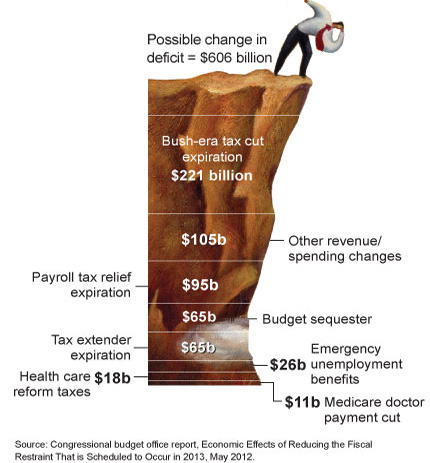 |
| I thought you said you WANTED to cut the deficit |
Then along came President Barack Obama, the ear-splitting summer of 2009 and the Affordable Care Act. Suddenly there was another social spending program that benefited people who weren't even white men, and the Republicans predictably deployed in a phalanx of opposition, not just to the plan itself, which was modeled on the basic Republican-preferred structure of universal coverage through private insurance and a mandate to sufficiently broaden the risk pool, but to the very idea that society should protect people who couldn't protect themselves. In their frenetic desperation to create an aura of fear and uncertainty around what was a very pedestrian proposal, the Republicans did something nobody would have predicted, something that has increasing ramifications in the American political discourse today: They took the position that the ACA was destroying Medicare, and attempted to present themselves as the guarantors of that very social spending program they had invested so many years in trying to eliminate outright.
The cognitive dissonance of a major conservative political party demanding NO cuts to Medicare, not even on the provider side, while their budgetary agenda still demanded "Entitlement Reforms" and their thought leaders came up with yet another plan to privatize and ultimately eliminate both Medicare and Medicaid only got louder in the run-up to the 2012 Presidential election. This left them in the difficult position of a Presidential campaign that could not offer any specifics about its proposed governing agenda. Even to people predisposed to vote for a more conservative candidate, this abject refusal to provide information about their policy plans left voters ultimately heeding a fully internalized caveat emptor worldview they had learned since childhood.
Republicans like to say that the primary driver of the "fiscal crisis" represented by the budget deficit is "Entitlement Spending", primarily Social Security, Medicare and Medicaid, with a number of small-bore social spending programs like Food Stamps tossed in for good measure. But this is an artificial construct, because all dollars are the same. It would be just as easy to characterize America's massive military spending as the primary driver of the debt - indeed, you could eliminate most of the annual deficit and still be able to defend the US from attack. A nation, like any community, must reach some kind of consensus around what services they expect to be provided by the community as a whole, and then it's merely a matter of agreeing on how the population will contribute the necessary funds. Deficits don't happen by accident, some act of an angry fiscal god. Congress appropriates funds for spending programs and passes bills that raise the revenue for those appropriations. If they lack the discipline or courage to legislate as much revenue as they do spending, they will have a budget deficit, but it is ridiculous for them to cry out in anguish over a problem they created and only they can solve.
Faced with the unworkable combination of a deeply unpopular core policy agenda and a deep political commitment to both sides of their key economic issue, the Republicans are left in the awkward position of being utterly unable to specify their policy preference. On taxes, they keep saying they prefer revenue increases generated by eliminating deductions, but have never been able to say which deductions they would target. They keep demanding some kind of vague, non-specific "Entitlement Reform" but seem unable to formulate a proposal. They have been shrieking for years about the impending calamity that is the budget deficit, but are resolutely unwilling to support any proposal that actually reduces deficit spending over the medium term. Until they are prepared to articulate their vision for financing the federal government, any and all demands for "serious, bipartisan negotiations" on the budget should be seen for exactly what the are - the helpless bleating of a dysfunctional political organization...
...
Look, if the Republicans are going to argue with the Democrats, they must take up a contrary position.
ReplyDeleteUntil they are prepared to articulate their vision for financing the federal government, any and all demands for "serious, bipartisan negotiations" on the budget should be seen for exactly what the are - the helpless bleating of a dysfunctional political organization...
ReplyDeleteThis is not meaningfully different from a fussy two-year old child who is only able to tell you what he doesn't want. Children are psychotic as a matter of nature, adults have no such excuse.
Look, if the Republicans are going to argue with the Democrats, they must take up a contrary position.
ReplyDeleteIf the Democrats are going to adopt the Republicans' asshole positions, the Republicans must take up even more assholish positions.
~